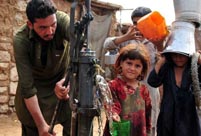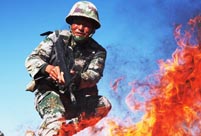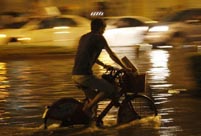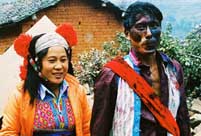Fifty leaders in world medicine, including three winners of the Nobel prize, on Monday urged all combatants in Syria to spare hospitals, doctors and nurses, warning that the country's medical infrastructure was being deliberately targeted and was now on the brink of collapse.
"Systematic assaults on medical professionals, facilities and patients are breaking Syria's healthcare system and making it nearly impossible for civilians to receive essential medical services," they said in an open letter published by the medical journal The Lancet.
"According to the World Health Organization, 37 percent of Syrian hospitals have been destroyed and a further 20 percent severely damaged. Makeshift clinics have become fully fledged trauma centers, struggling to cope with the injured and sick. According to the Violations Documentation Center, an estimated 469 health workers are currently imprisoned, and about 15,000 doctors have been forced to flee abroad, according to the Council on Foreign Relations. Of the 5,000 physicians in Aleppo before the conflict started, only 36 remain."
The letter described the attacks as "deliberate and systematic ... (and) an unconscionable betrayal of the principle of medical neutrality".
"We call on the Syrian government and all armed parties to refrain from attacking hospitals, ambulances, medical facilities and supplies, health professionals and patients; allow access to treatment for any patient; and hold perpetrators of such violations accountable according to internationally recognized legal standards," it said.
"We call on all armed parties to respect the proper functions of medical professionals and medical neutrality by allowing medical professionals to treat anyone in need of medical care and not interfering with the proper operation of healthcare facilities."
Signatories included former WHO chief Gro Harlem Brundtland; Unni Karunakara, international president of Doctors Without Borders; Michel Kazatchkine, UN special envoy for AIDS in Eastern Europe; Mohammed al-Maadheed, president of the Qatar Red Crescent and vice-president of the International Federation of Red Cross and Red Crescent; Sir Michael Rawlins, president of Britain's Royal Society of Medicine; and Nobel winners Jules Hoffmann from France, Peter Agre from the US and Harald zu Hausen from Germany.
 Pakistan suffers desperate shortage of water
Pakistan suffers desperate shortage of water Lanzhou MAC conducts actual-troop live-ammunition drill
Lanzhou MAC conducts actual-troop live-ammunition drill Heritage train ride across western Kosovo
Heritage train ride across western Kosovo Heavy rain hits Hangzhou, causing traffic jam
Heavy rain hits Hangzhou, causing traffic jam Students wade through water to school
Students wade through water to school Dabaiyi wedding ceremony in China's Yunnan
Dabaiyi wedding ceremony in China's Yunnan Harbin named Chinese city with most beautiful women
Harbin named Chinese city with most beautiful women Weekly Sports Photos: Bale transfers to Real Madrid
Weekly Sports Photos: Bale transfers to Real Madrid Funniest photos of sport stars as kids
Funniest photos of sport stars as kids  Residences of the royal house of Savoy
Residences of the royal house of Savoy China's frigate 'Bengbu'in fire training
China's frigate 'Bengbu'in fire training The last days of Wan Aihua
The last days of Wan Aihua Highlights at 12th National Games of China
Highlights at 12th National Games of China Beijing Film Academy welcomes freshmen
Beijing Film Academy welcomes freshmen 2013 Taiwan Int'l Tourism Expo kicks off in Taipei
2013 Taiwan Int'l Tourism Expo kicks off in TaipeiDay|Week|Month